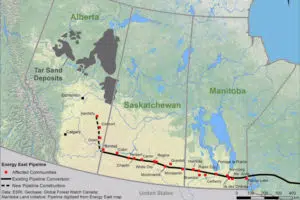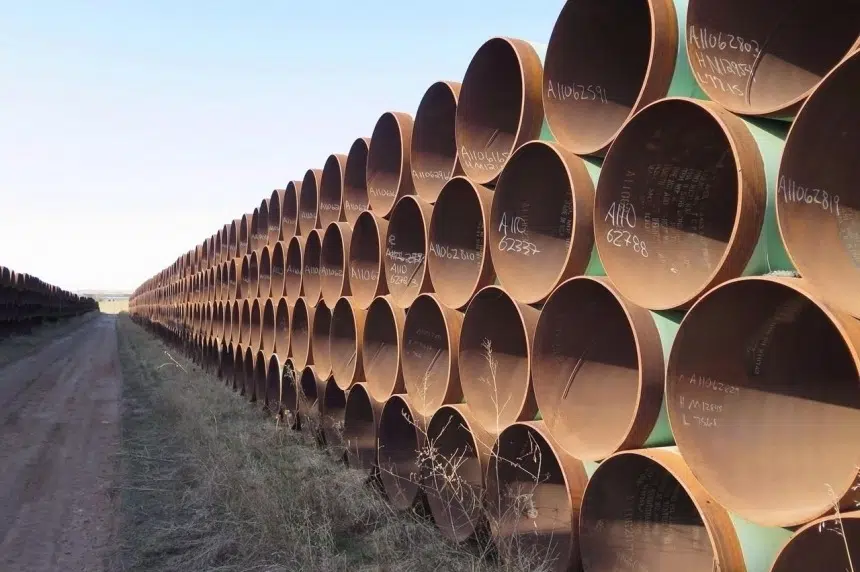TransCanada has announced it is cancelling plans for the Energy East pipeline.
Energy East would have carried oil from Alberta and Saskatchewan to refineries on the east coast for processing, and shipment overseas.
The project was a 4,600 kilometre pipeline that would have carried up to 1.1 million barrels of crude oil a day.
Much of the pipeline would have been converted from an existing natural gas pipeline, including the entire length that currently runs through Saskatchewan.

Map showing route of Emergy East pipeline through Alberta, Saskatchewan and Manitoba. (Council of Canadians/ Flickr)
The project was first proposed in 2013 and met a lot of resistance, especially in Quebec, where critics said it didn’t have enough benefits to make for up for the environmental risk. Many environmental groups opposed the pipeline as well.
Saskatchewan Premier Brad Wall was an advocate for the pipeline project, voicing his support for it on many occasions, including trips to eastern Canada.
Wall had previously said the project would create 14,000 jobs in Canada, and up to $10 billion in revenue.
On Thursday morning the premier tweeted his reaction to the news.
#EnergyEast dead. 1000s new jobs lost. Cda to keep importing foreign oil. West can't get oil to tidewater. Mtl mayor calls it"major victory"
— Brad Wall (@PremierBradWall) October 5, 2017
In a statement released by TransCanada, the company said it is currently reviewing the company’s $1.3 billion carrying value.
“In light of the project’s inability to reach a regulatory decision, no recoveries of costs from third parties are expected.”
Last month the company revealed that it was suspending efforts to get regulatory approval.
Sask. gov’t disappointed with pipeline cancellation
Deputy Premier of Saskatchewan, Don Morgan reacted to the news of Energy East’s demise Thursday morning in an interview on Gormley.
He said the loss of the project would mean a hit to the province’s oil industry, as the inability to ship to new markets would continue to force Western Canadian oil producers to accept a lower price for their product.
“So now we’re going to be losing millions and millions of dollars a day on oil that we are not able to get to tidewater, that we are not able to export,” Morgan said.
Morgan said the decision also shouldn’t be viewed as a victory for the environment, pointing out that oil shipments will simply continue by rail or truck.
“Rail transport is about four-and-a-half times more dangerous than pipelines. Pipelines are clearly the most economical way to do it and less disruptive on our highways,” he said.
Meanwhile, Morgan said Saskatchewan oil production is expected to grow by 43 per cent in the next few decades up to 1.7 million barrels per day by 2040.
Energy East decision could impact Canada’s international brand: business analyst
980 CJME business analyst Paul Martin said the project looked to be in trouble when TransCanada suspended its application to the National Energy Board, as the regulator moved to expand the scope of its review of the project.
“Some people probably just assumed well that was the beginning of the end, that the project was over and it was really because of the sort of higher level or higher bar that was being imposed on TransCanada to prove that it was a worthy project,” Martin said Thursday morning.
In an interview with the 980 CJME Morning Show, Martin said the most onerous challenge was the notion of tracking downstream carbon emissions created by the pipeline. He compared it to figuring out where all the electricity from a power plant was used.
Martin said cancellation of Energy East is much bigger than a domestic business issue, he said the decision could influence Canada’s international brand.
“This is a country that has a large land mass, a very small population and it’s highly productive. We’re all about exporting, and this is a big one that says maybe you can’t trust us to get our product to market now,” Martin commented.
He said the country appears to be stacking up battles against the oil industry, pitting the east against the west and creating a lot of alienation and frustration on the Prairies.
With the federal government looking at setting the bar even higher for approval of projects like this one, Martin said there’s a risk money managers start getting fed up and take their capital projects to other markets.
—with files from Canadian Press







